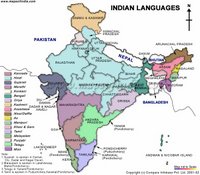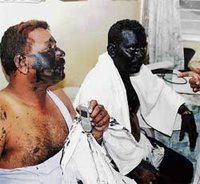Language Wars
 Bangalore and other cities of our South India home state of Karnataka were “closed” yesterday. A territorial dispute with the neighboring northern state of Maharashtra mixed with language group chauvinism was a combination too alluring to be passed up by vote-grabbing politicians.
Bangalore and other cities of our South India home state of Karnataka were “closed” yesterday. A territorial dispute with the neighboring northern state of Maharashtra mixed with language group chauvinism was a combination too alluring to be passed up by vote-grabbing politicians. In the US, crossing a state border is a passive event. One travels from state to state in near oblivion of the geopolitical demarcations. Not so in India. State borders are guarded with large boom gates that swing upward allowing passage only after certain “formalities” are completed. The formalities for commercial vehicles mainly consist of the payment of a tax and a possible inspection for contraband.
In the US, crossing a state border is a passive event. One travels from state to state in near oblivion of the geopolitical demarcations. Not so in India. State borders are guarded with large boom gates that swing upward allowing passage only after certain “formalities” are completed. The formalities for commercial vehicles mainly consist of the payment of a tax and a possible inspection for contraband.More significantly, a state border is the entry
 port into another slice of Indian culture based on language groups. There are over 400 languages spoken in India. The British colonial powers organized political boundaries along language lines. Post-independent India followed the practice, but crafting state borders based on language is an iffy proposition. Yesterday’s bandh, or general one day strike, was a consequence of the “rough border edges” of the Kannada-speaking state of Karnataka and the Marathi-speaking state of Maharashtra.
port into another slice of Indian culture based on language groups. There are over 400 languages spoken in India. The British colonial powers organized political boundaries along language lines. Post-independent India followed the practice, but crafting state borders based on language is an iffy proposition. Yesterday’s bandh, or general one day strike, was a consequence of the “rough border edges” of the Kannada-speaking state of Karnataka and the Marathi-speaking state of Maharashtra. The controversy has been long simmering. Last year in Belgaum, the epicenter of the territorial dispute, the mayor and those coming to his rescue had their faces painted black by Kannada language activists. The mayor, it seemed, appeared too cozy with the Marathi-speaking population of Belgaum. A recent change in political support from the Center's claim to a “let’s take another look at the situation” was the spark for the bandh.
The controversy has been long simmering. Last year in Belgaum, the epicenter of the territorial dispute, the mayor and those coming to his rescue had their faces painted black by Kannada language activists. The mayor, it seemed, appeared too cozy with the Marathi-speaking population of Belgaum. A recent change in political support from the Center's claim to a “let’s take another look at the situation” was the spark for the bandh.In Karnataka, the Kannada language speakers, especially in Bangalore, have cause for concern over the ascendancy of their language and culture. The global IT boom of India is fueled by English speakers. English is the common language that binds different language groups together. The Kannada film industry struggles against the attraction of non-Kannada language films. Recently, the "language police" (state politicians) prevailed politically and succeeded in closing 1,400+ schools in mid-year because their medium of instruction was English and not Kannada, violating a 1994 law that was never enforced until last week.

 The real rub is that Kannada speakers are generally poor. Their hands and backs build the roads, buildings and offices of this global community, but they live outside the gated communities and the away from the standard of living of most English speakers. However, they vote and have a political mass that can not be ignored by politicians who want to stay in office. Yesterday was a vivid example of the world’s largest democracy in action.
The real rub is that Kannada speakers are generally poor. Their hands and backs build the roads, buildings and offices of this global community, but they live outside the gated communities and the away from the standard of living of most English speakers. However, they vote and have a political mass that can not be ignored by politicians who want to stay in office. Yesterday was a vivid example of the world’s largest democracy in action.Labels: Language Wars

0 Comments:
Post a Comment
<< Home